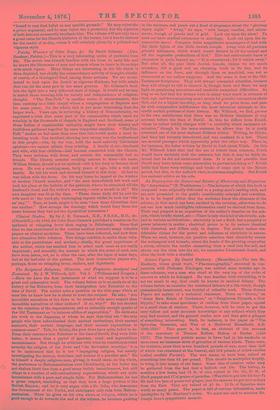The Scriptural Religions, Histories, and Prophecies Analysed and Examined. By
J. W. Willcock, Q.C. Vol. I. (Williams and Norgate.) —Here we have the first instalment of what we suppose is to be a great and exhaustive work. The volume before us is an analysis of the history of the Hebrews, from their immigration into Palestine to the time of David. The author asks a question on the title-page which at once lets us know how he is about to treat the subject. He asks, "Are incredible narratives of the Jews to be treated with more respect than incredible narratives of other authors? If so, why ?" He has decided on the rejection of the supernatural, and so naturally enough speaks of the Old Testament as "a ruinous edifice of superstition." He dedicates his work to the Japanese, of whom he says that they are "the only people who have subordinated their ancient institutions, their ancient manners, their ancient language, and their ancient superstition to common-sense." This, he thinks, the poor Jews have quite failed to do. From their entrance into Palestine to the time of David, they were little better, it seems, than a parcel of ignorant, cruel, and superstitions mountaineers. But though he criticises with what he considers merited severity the religion of the Jews and "its derivative worships," it is to be understood that he is not "impugning religion, but merely investigating the history, doctrines, and actions of a peculiar sect." He is himself a deeply religions man, giving, it would seem, on the whole, the preference to Mahommedanism over Christianity, as the latter has not shaken itself free from a good many foolish ineumbrances, but still clings to a number of self-contradictory superstitions, which are quite inconsistent with a pure and simple faith. For Mahommedans he has a great respect, reminding us that they form a large portion of the British Empire ; and he is very angry with a Dr. Odin, who deaounces the Government of the Turks, and anticipates only ruin from Mahom- inedanism. When he gives us his own views of religion, which he is good enough to do towards the end of the volume, he becomes gushing
in the extreme, and pours out a flood of eloquence about the "glorious starry night." "Away," he says, "with lamps, candles, and adorn- ments, though of jewels and of gold. Look out upon the stars! Ye need not have studied astronomy or astrology. Look out upon the in- numerable stars ! Compare these magnificent messengers of God with the little lights of the little Jewish temple. Away with all partisan priestly influences, which would create discord in all the animal and all the vegetable productions of God." This last enthusiastic burst of eloquence is quite beyond us,—" It is evanescent ; let it vanish away."
But after all, the poor little Jewish temple, unless we are much mistaken, did a good and an elevating work in its day, and its influence on the Jews, and through them on mankind, was not so evanescent as our author supposes. And the same is true of the Old- Testament Scriptures. They will always command attention, because they will always be felt to deserve it, though here and there we may light on perplexing narratives and insoluble numerical difficulties. So long as we feel that the writers were in many ways much in advance of their age, and were preparing men's minds for grander conceptions about God, and for a higher morality, so long shall we prize them, and pass by with comparative indifference the most laborious attempts to dis- credit certain portions of their history. Mr. Willcock, we find, proves to his own satisfaction that there was no Hebrew literature of any account before the time of David. In this he differs from Ewald, whom he rather boldly charges with "a credulity which surpasses ad- miration," though in the same sentence he allows that be is justly esteemed one of the most eminent Hebrew critics. Writing, he thinks, had been but recently introduced, and was confined to a few. There are several passages which apparently point the other way. There is, for instance, the letter written by David to Joab about Uriah. On this Mr. Willcock hints that had the use of letters been common, Uriah would have certainly read the contents, but that it may be fairly in- ferred that he did not understand them. Is it not just possible that David may have taken some precaution to prevent his doing so ? Ewald holds that there were writings and books of some sort in the Mosaic period, but this, in the author's view, is extreme simplicity. But Ewald has eminent critics on his side.


































 Previous page
Previous page